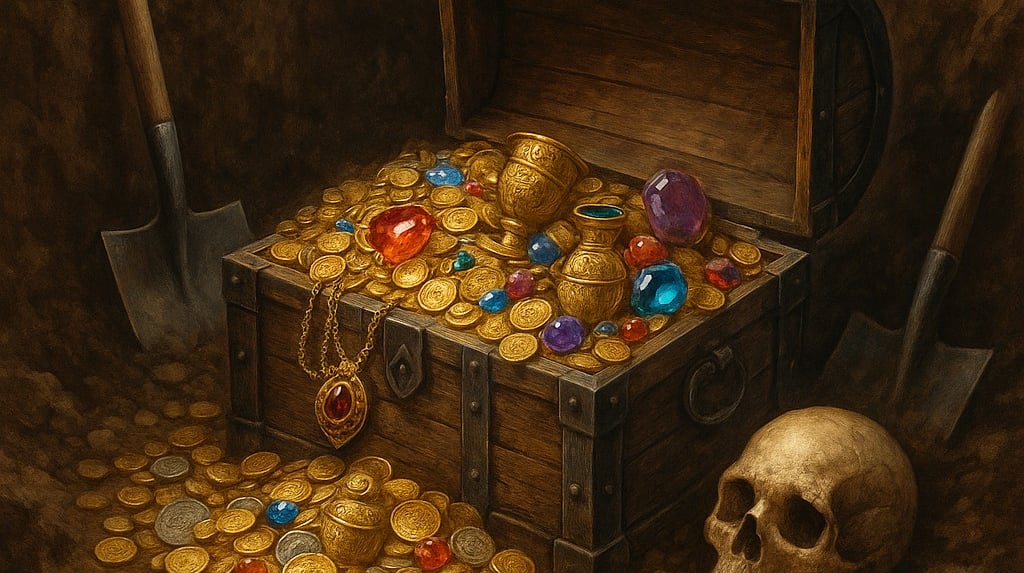The Curse of Treasure
Finding lost treasure may be the WORST day of your life!
Lew Marcrum
8/17/20256 min read


Most of us at sometime in our Wonder Years have idly daydreamed of finding lost or buried treasure, piles and chests of gold, gems, doubloons and pieces of eight. Whether it be sunk Spanish galleons, buried hoards of long-dead brigands hoping to escape the noose, or legitimate gold shipments hastily hidden to avoid discovery by attacking hostiles, the prospect of instant and untold wealth has always been the most effective potion to activate the human greed glands!
Finding lost treasure is a rare occurence reserved for the extremely lucky, but it DOES happen, and with a lot of good research and effort it could happen more. But uncovering more gold than you can haul away in a month doesn't always mean you are filthy rich; it COULD mean exactly the opposite and you may find yourself feeling extremely fortunate that you are not in prison or a cemetery.
THE DREAM AND THE REALITY
The Dream
A mansion on Snob Hill from whose 12-car garage you drive your shiny new custom-made V-16 Bugatti Royale which operates only on the finest champaigne, and in the passenger seat a smoking-hot young blonde who operates only on the finest money. The world is your oyster, and you slowly tool around for all to see as they realize YOU are the master of all you survey.
Then the bomb hits like a MOAB!
The Reality
So, after years of painstaking research, searching and the frustrations of defeat after defeat, you have FOUND IT! Your ship has come in! So.....now, what to do with it?
The first priority is to remove it from it's resting place and to a more secure location. If you are alone you may need some help, meaning witnesses, partners, all wanting a share. If it's small enough for you to handle alone, so much better the luck.
Now you have a life-changing decision to make: do you go the legal route and report this find to.....somebody, and lose 85 to 90 percent of the value after years of litigation in more courts than you thought existed. Or do you go the other way, try to keep the entire treasure for yourself, and face the very real risk of losing IT ALL and spending many years in prison?
The Legal Route
Remember Mel Fisher, the metal detector manufacturer and treasure hunter who found the sunken Spanish galleon Atocha? Being and honest man, he went the legal way and reported his find which was worth BILLIONS even in those days. The Feds moved all Mel's recovered treasure to a secure government facility for safekeeping while it was being investigated and outside claimants submitted their claims.
And claimants there were! Since it was found in US territorial waters, the US claimed the treasure. It was found off the coast of Florida, so the State of Florida claimed it. It was on a Spanish ship bound for Spain, so the government of Spain claimed it. It was from Spanish colonies under tacit control of the Catholic Church, so they also claimed it. Several maritime insurance companies claiming to hold the original contract for Atocha, claimed the hoarde. And, like cockroaches from the woodwork, came thousands of charlatins, conmen, shyster lawyers, high-pressure salesmen and "investment brokers", as well as more thousands of unknown and unheard of "relatives" most with papers in hand showing their right of inheritance to the treasure.
It took Fisher YEARS of waiting for claims to clear the courts before any disposition of the treasure was finally made. Mel and his crew in the end found themselves with a relative pittance of the original value of their find.
This story of the Atocha is not a fluke, it happens in much the same way with every significant treasure find that is ligitamately reported.
The Secretive Route
Ok, so you've dug it up and buried it again in your basement, installed security cameras, alarms and vicious guard dogs. Again, how can you spend all this money? You can't cash Colonial Spanish escudos at your local bank, nor can you buy groceries and gasoline with them. Old Spanish gold and silver coins draw ENORMOUS attention, and if your aim is to avoid the IRS, attention is exactly what you DON'T WANT. You may get away with selling one or two coins by claiming they are family heirlooms or metal-detecting finds. but any more will soon raise eyebrows.
Let me clarify a couple things. Unlike in the 1930s it is NOT illegal now to own gold, silver and treasure in the US. The IRS is not interested in your physical metals but only in the money from their sale. You can have a billion dollars in gold buried in your basement but still owe NO taxes until it's sold. The IRS is not your problem, but the FBI is. It's the FBI's job to investigate actual and potential claimants to your find and determine the legal and rightful owners.
You have a few options if you wish to keep out of the Feds' sight:
1. Rebury the find and walk away (which you WON'T do!).
2. Put it in a bank safe deposit vault, but if you raise their curiosity they will report you to the FBI.
3. Seal it in PVC pipes, bury it in your back yard and sell off the gold one piece at a time like a legitimate coin collector. Depending on how much you have, it could take generations to launder it all.
4. Try to smuggle it out of the US to a country with more favorable treasure trove laws. If you get caught, which is likely, not only will you lose ALL your gold but you will probably spend the major portion of the rest of your life in prison.
5. Sell it to a legitimate gold buyer. For a goodly amount of lucrative business he MIGHT NOT report you to anyone. You could always sell it to a shyster gold buyer or a fence, but only if you are willing to settle for the 15-20% he would give you.
As you can see, treasure is almost as hard to get rid of as to find. But once you almost enevitibly draw the attention of the FBI, it gets worse.
OBSTACLES AND MINEFIELDS AWAITING THE "SUCCESSFUL" TREASURE FINDER
To Whom does the Treasure Really Belong?
In these modern times there is no unclaimed land. Every square centimeter of land or water on God's Green Earth is owned or claimed by SOMEBODY. Usually several somebodies, and ALL will have a greater legal claim to the find than you. There will be dozens, maybe hundreds, of claimants all saying the treasure belongs to them. One thing we know for certain, it doesn't belong to YOU!
1. Was it found on private property or a legal mining claim? If so, then the owner has first legal right to the hoard, and you could be prosecuted for trespassing, theft and anything else the owner's lawyer might dream up. The gold belongs to the property owner, and you may wind up with nothing other than a hefty prison sentence.
2. Found on Tribal lands? Say goodbye to your treasure. They may not prosecute you, but you will probably end up with a figurative boot in your behind and told not to come back.
3. The pecking order of treasure ownership:
Federal government
Tribal government
State government
County
Municipality, if found within their bounds
Property owner
You, the discoverer
EVERYBODY has a better claim than you!
So.....WHAT CAN YOU DO?
You have treasure enough to make you rich for a dozen lifetimes, and yet you have NOTHING. You can't spend it. You can't sell it without great risk of major problems. I do not advocate anything illegal, but I can see only one way to keep MOST of the value of your find and not go to prison!
First: Pray to all the Gods in Valhalla that if you ever find a large hidden treasure, you do so ALONE! Witnesses are poison, and no matter how much you trust your partners, they will eventually get you into some serious trouble. All you need is one of your friends suddenly paying off a huge mortgage with cash, buying a new pickup with cash, or bragging on Facebook or TikTok about taking the family on a world cruise. All on a working man's salary. Very soon the Feds will sweat the truth from him and they will be on YOU like my dog on a porkchop.
Second: Privacy and discipline will keep you safe. As an old quote says, "Act Chinese". A Chinese businessman may be a multi-millionaire, but he doesn't show that in public. He projects the humility of a laborer and keeps a low profile.
Third: "Process" your treasure without sentiment. By that I mean you have to forget about collector or archaelolgical value, for the most part. Search through your hoard and find the 20 or 30 coins with the most numismatical value, and deposit them and any gemstones in your PVC backyard vault. The rest, along with ALL artifacts, go directly into the smelter. Once smelted and poured into 10- or 12-ounce bars the "fingerprint" of the metal will be changed, making it very difficult to trace to any particular origin. There are ways to make it 999.9 fine, pure gold, but that's beyond the scope of this post. It would, however, make the metal ABSOLUTELY untraceable.
CONCLUSION
Dealing with a huge treasure hoard is always exciting, always life-changing, and ALWAYS a royal pain! In a way it's good that most of us will never have that problem.
For the rest of us mere mortals it's best to content ourselves with finding a lot of small treasures rather than a huge one. It's safer, more certain and with a modicum of effort and dedication you can make some pretty good money. I will go into that in another post.


YOU